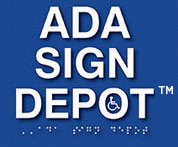The Word Handicapped Should Be Eliminated from Our Vocabulary
ADA Sign Depot
May 31, 2014
 Handicapped Should Be Eliminated from Our Vocabulary
Handicapped Should Be Eliminated from Our Vocabulary
The ADA (American Disability Act) has already enacted the use of the word “disability” in replacement of “handicap,” so it’s time the rest of us follow suit.
When we hear the word “handicap,” most people think of a person with a disability. That’s what society has taught us to think. Parking spots that are designated for people with disabilities have always been referred to as “handicap parking spots.” Bathroom stalls that are designed for people who use wheelchairs, or need extra space, have been referred to as “handicap stalls.” So, it’s no surprise that the word “handicap” has been socially accepted for so long. When you think of the word “handicap,” what do you think of? I think of golf. Golfers are given a handicap that is based on their potential playing ability. Handicaps allow players at different levels to play against each other on somewhat equal terms. Most of us don’t think of golf, however.
Disabilities can affect anyone at anytime. There are countless ways to become disabled. It can happen to you, your friends and any of your family members, at any age. It can be a fluke accident, a botched surgery, an illness, etc.. No one is immune. So, why do we segregate an entire group of people (a group that any of us can be members of at any time) by titling them “handicapped?” Would you want to be given that title if you had a disability? Or would you want to do your best to not allow your disability to restrict you from doing the things you want to do, and in return, to not constantly be told you are unequal?
The ADA (American Disability Act) has already enacted the use of the word “disability” in replacement of “handicap,” so it’s time the rest of us follow suit. It will take a conscious effort, but the change is necessary. In addition to removing “handicap” from our vocabulary, here are a few more common terms that have negative connotations and should be avoided:
Disabled person
Referring to someone as a “disabled person” is dehumanizing. It refers to the disability as a characteristic of the person’s identity. If you have to say it at all, say “person with a disability.” Person-first terminology implies that the person’s disability is a part of them, but doesn’t define them. We are all people first. Being rich doesn’t define us, neither does being poor, college educated, a high school dropout, overweight or thin. Same with our ethnicity and religion. We are all human, and that defines our very existence. Most people prefer to go by their name, anyway.
Impaired
Just because someone might not be able to see you well, or at all, doesn’t mean they can’t hear you call them visually impaired. The same goes for someone who is Deaf. The word “impaired” emphasizes what someone can’t do instead of what they can. No need to use fancy words to dance around what may or may not be politically correct. Stick with Blind and Deaf, but remember to use person-first terminology.
Jill lives in West Hollywood and thinks it’s weird that riding stationary bikes in a dark room is a thing, but frequently does it anyway. She suffers from an addiction to cookies, chips, and her dog, Riley. She’s a world renowned writer of texts and emails, and is okay at Twitter and her Blog. She’s proficient in friendship and quality time.
- Tags: ADA People Subscribe to this blog's RSS feed.


